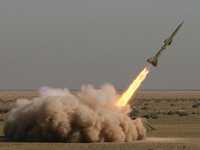Missile shield moves forward, but alliance policy statement doesn’t mention Iran as its object
 The North Atlantic Treaty Organization (NATO) is getting ready to build a defensive shield of missiles based in Turkey and eastern Europe but, thanks to Turkey and its new policy of fast friendships in the Middle East, the missiles’ officially have no enemy to aim at.
The North Atlantic Treaty Organization (NATO) is getting ready to build a defensive shield of missiles based in Turkey and eastern Europe but, thanks to Turkey and its new policy of fast friendships in the Middle East, the missiles’ officially have no enemy to aim at.
As originally conceived, the $270 million U.S.-backed missile system was designed to protect Europe against possible attacks by “rogue states,” a code word for Iran. But intensive lobbying by Ankara at NATO’s Lisbon summit over the weekend pushed the alliance into adopting a neutral stance on targeting. “The alliance does not consider any country to be its adversary,” NATO’s Strategic Concept declared in an end-conference statement.
The compromise formula, which was opposed by France and other NATO members, is the latest sign of Turkey’s efforts to distance itself from the West and warm up to its neighbors in the Middle East, including Iran and Syria — two states the U.S. regards as hostile. Analysts say Ankara remains committed to the alliance, but they see continued friction ahead.
”It seems neither side is listening to the other before these problems emerge. There is a growing sense of distrust between Turkey and its traditional Western allies. Both sides have to do much more to overcome this distrust,” said Hugh Pope, Turkey-Cyprus project director for the International Crisis Group.
Last September, NATO Secretary-General Anders Fogh Rasmussen named Iran’s nuclear program as one of the reasons that justify the necessity of a missile system. “If Iran eventually acquires a nuclear capability, that will be very dangerous, and a direct threat to the allies,” he told a conference.
As the date for the NATO summit approached and Turkey’s opposition appeared implacable, Rasmussen backed down, saying the final plans of the missile system “need not mention the names of any particular country.” He said some 30 countries possess ballistic systems that could hit Europe. “This is reality; you don’t need to mention names,” he told Germany’s Welt am Sonntag newspaper last week.
Europe, and Turkey in particular, have reason to be concerned about Iran’s arsenal. Tehran’s longest-range ballistic missiles, including the Shahab-3 and the Qiam-1, have ranges of around 2,500 miles, putting NATO allies Turkey and Greece in their line of fire. Europe’s anti-missile defenses now consist of American-made SM-3 missiles, based on American warships. Concern about Iranian missiles is coupled with the West’s fear that Tehran is developing nuclear weapons to arm them.
Turkey is opposed to Iran’s developing nuclear weapons but has sought to emphasize a negotiated solution to ending the program rather than engaging in threats, including labeling the missile shield as a measure to defend against Iran, Pope told The Media Line. He said Turkey remains committed to the Western alliance and, indeed, has pulled back from staking out more independent positions after an initiative it took with Brazil last May to reach a nuclear accord with Iran elicited an angry U.S. response.
“Turkey found itself on a limb and found that uncomfortable,” Pope said.
Nevertheless, the missile issue isn’t over. Although NATO allies agreed to the deployment in principle, they will only decide next June where to locate the weapons and command center. Ankara is angling to have NATO’s İzmir headquarters designated as the command center, instead of Germany’s Ramstein base, as the U.S. wants, Istanbul’s Hurriyet newspaper reported Monday.
“It’s an agreement for now just to get the problem away, but it’s not the end of the problem,” Hüseyin Bagci, a professor of international relations at the Middle East Technical Univeristy in Ankara, told The Media Line.
He said that Turkey’s move will do little to assuage Iran, but that Ankara believe the option it has created for itself as a bridge between the West and Middle East will help moderate the reaction.
Some analysts in the West – and particularly in Israel, which has seen a sharp deterioation in ties with Turkey – say Ankara’s new orientation reflects the tastes of Turkey’s ruling Justice and Development Party (AKP), which is mildly Islamist. But Bagci discounted AKP’s ideology as being behind the shift, saying it was a function of economics.
Two-way trade between Turkey in the Middle East grew to $40 billion last year from $7 billion in 2002 as the price of oil raised the cost of Turkey’s imoported indsutry. But just as importantly, Turkey’s growing indsutrial might is turning the Middle East into a key export destination for eveything from television sets to prepared foods, Bagci said.
“Turkey is committed to the West, it won’t be on the side of Iran – but it will mediate, to cool down any Iranian reaction,” said Bagci, who is currently a visiting professor at Humboldt University in Berlin.
He said that in the regional competiton between Turkey and Iran, Turkey is in the stonger position because it is economically dynamic and enjoys close trade ties with the European Union. By contrast, Iran, which is feeling the pressure of Westen sanctions and the failure to succesfully export its Islamic revolution.
Copyright © 2010 The Media Line. All Rights Reserved.